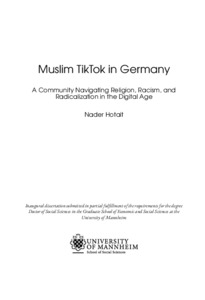|
Muslim TikTok in Germany. A community navigating religion, racism, and radicalization in the digital age
Hotait, Nader
![[img]](https://madoc.bib.uni-mannheim.de/69986/1.hassmallThumbnailVersion/hotait_dissertation_cdss.pdf)  Vorschau |
|
PDF
hotait_dissertation_cdss.pdf
- Veröffentlichte Version
Download (5MB)
|
|
URN:
|
urn:nbn:de:bsz:180-madoc-699861
|
|
Dokumenttyp:
|
Dissertation
|
|
Erscheinungsjahr:
|
2025
|
|
Ort der Veröffentlichung:
|
Mannheim
|
|
Hochschule:
|
Universität Mannheim
|
|
Gutachter:
|
Kalter, Frank
|
|
Datum der mündl. Prüfung:
|
2025
|
|
Sprache der Veröffentlichung:
|
Englisch
|
|
Einrichtung:
|
Außerfakultäre Einrichtungen > GESS - CDSS (SOWI)
Fakultät für Sozialwissenschaften > Allgemeine Soziologie (Kalter 2009-)
|
|
Lizenz:
|
 Creative Commons Namensnennung 4.0 International (CC BY 4.0)
Creative Commons Namensnennung 4.0 International (CC BY 4.0)
|
|
Fachgebiet:
|
004 Informatik
290 Andere Religionen
300 Sozialwissenschaften, Soziologie, Anthropologie
|
|
Freie Schlagwörter (Englisch):
|
muslims , Germany , TikTok , racism , radicalization , representation
|
|
Abstract:
|
This dissertation examines the complex representation of German Muslims on TikTok, as well as its connection to religion, racism, and radicalization. The core inquiry is focused on three main research questions: first, identifying the topics and issues addressed by German Muslims in their TikTok content; second, analyzing how this content relates to religion, anti-Muslim grievances, and radical ideologies; and third, assessing the impact of this content consumption on the values and attitudes of German Muslim TikTok users, specifically whether it promotes radicalization or acts as a preventive force. Using a comprehensive analytical approach, the study examines various representations of Muslims on the platform, employing qualitative-hermeneutical and quantitative methodologies. The study investigates the production and consumption of content on TikTok and incorporates gendered approaches to highlight the distinct experiences of male and female Muslim users. The dissertation is organized into three empirical chapters, each addressing a specific facet of these questions. Collectively, they offer a comprehensive understanding of how TikTok shapes the experiences and representations of German Muslims and their relationship to radicalization. This study aims to address the significant research gap concerning the diverse content produced by German Muslims on TikTok and its impact on users, shifting the focus beyond extremist narratives to consider the platform's dual potential for radicalization and representation.
|
 | Dieser Eintrag ist Teil der Universitätsbibliographie. |
 | Das Dokument wird vom Publikationsserver der Universitätsbibliothek Mannheim bereitgestellt. |
 Suche Autoren in Suche Autoren in
Sie haben einen Fehler gefunden? Teilen Sie uns Ihren Korrekturwunsch bitte hier mit: E-Mail
Actions (login required)
 |
Eintrag anzeigen |
|
|
